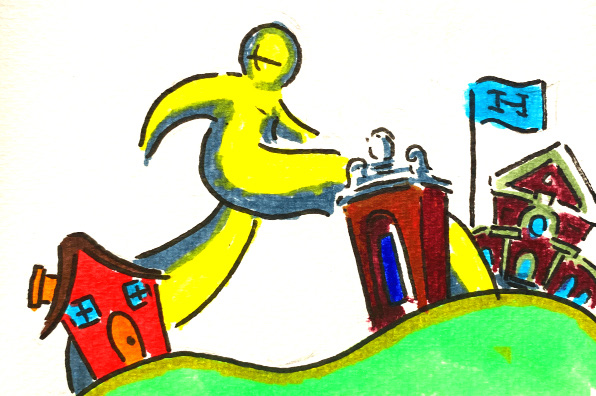We know from research and listening to the voices of trans people that transitioning makes them happier and more comfortable in their skin. Just listen to my friend Rocko share some of his journey with me:
“I was 7 when I was diagnosed with ‘gender identity disorder.’ I would express myself as any boy would. I hung out with boys and wore boy clothes, but I wasn’t being identified as a boy and was going by my birth name and she/her pronouns. When people told me I was not a boy, I didn’t have the words or language to tell them they were wrong, but I knew they were. I wanted to be liked, not disagree with people.
I was twelve when I figured out what being transgender was through the media. The show ‘Degrassi’ introduced me to my first trans person. An assumption people make is that the media is influencing people to be trans. But it truly comes from a sense of self. I saw the show and realized I see myself through that person.”
So why should anyone else care whether Rocko lives happily now as a boy although he was born with a female body? And why would anyone actively protest against his happiness or the happiness of any other person?
The answer is culture. Society pressures us to look, act, and dress a certain way, and most of the time, we give in. Our susceptibility to peer pressure is also the reason that gender roles adapt so rapidly; it used to be that men wore heels, but this stylistic choice is now considered “feminine.” Culture creates labels such as “masculine” and “feminine.” If you ask me, these categorizations are often problematic for both cis and transgender people alike. Why would we not want to let all people experiment with their gender expression to see what feels best for them?
I often hear people say that media has “caused” young people to become trans. But that is not reflected in the experience of most trans people—just ask them. As Rocko mentioned, the media only validates feelings that people are already experiencing and gives people role models for how they can live happier lives. It opens up people’s perspectives and shows them that they are not alone.
(A side note: media influences everything. From the clothes we wear to the food we eat, every single person is subject to some sort of media influence. It’s completely unfair to label transgender folk as unduly “influenced” when we all use the media to be inspired, find role models, and imagine fulfilling lives for ourselves).
A lot of people have concerns about young people transitioning. But it’s important to go beyond the misinformation that is spread about trans youth and instead accept the truth: no one transitions overnight. Before any young person takes permanent steps like hormones or surgery, they need permission from parents, doctors, and other health professionals. Contrary to popular belief, it’s not a path one can take lightly. (Side note: The most common “transition” steps taken by minors are social steps—like name and pronoun changes—followed by puberty blockers—medications that delay puberty while children and their caregivers decide on the next steps. Their effects are totally reversible. The Harvard School of Public Health has recently found “little to no utilization of gender-affirming surgery procedures among trans youth; they are, in fact, more common among cisgender minors.”)
Yes, some trans people will regret the changes they’ve made, just as with almost every other life decision. But if 1,000 people are happier due to their transitions, should we reject the process just because one person regrets it? According to the American Journal of Surgery, only around 1% of people express regret after gender-affirming surgeries, compared with 47% of patients after breast reconstruction, 5-10% after breast augmentation, and 20% after bariatric surgery.
And consider: Why do trans people have a unique burden to explain who they are and justify their life choices? Rarely, if ever, are cisgender people expected to explain their gender— it’s a blatant double standard to demand the trans community justify their gender identities and transitions.
Even now, I don’t have the level of emotional intelligence to be as confident in my identity as four-year-old Rocko. But I have the privilege of waking up every morning and being seen as I want to be seen. Most of us take the ability to wake up as our authentic selves for granted, but for trans people, that’s not the case. Being trans takes a level of emotional honesty, perseverance, and commitment to oneself that I find inspiring.





